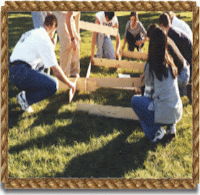The final lesson of stupid games that I will discuss is teamwork.
I worked with a manufacturing company that suffered from declining profits due to production and quality problems. To get to the bottom of the issue, we played the “Plank Game;” picture interlocking Lincoln Log like wooden planks that must be assembled in a particular way. (A description of the game and how to play is included at the end of this article) I divided the group into three teams. Each team of nine was given a diagram from which to assemble its set of planks. Each set was similar but not inter-changeable. The groups had to construct all three sets of planks in less than 20 minutes.
The game started strong, with one team finishing the set-up in 14 minutes. The members of that team immediately rose to help the other teams. Together, they assembled the remaining sets in four more minutes for a total setup time of 18 minutes. This is also a fine time. However, the first group to finish overlooked the idea that they could invite the other teams to build their designs on top of the already-completed set. This technique would have allowed them to avoid “re-inventing the wheel.” If they had done this, they could have saved significant time.
In the post-game debrief, we looked at applying the principle of “sharing between groups” and what could be gained by being more interactive and communicative at work. They were then able to design a process to enhance communication and performance during shift handoffs. Production quality and relationships between the shifts have improved markedly since the session.


No comments:
Post a Comment